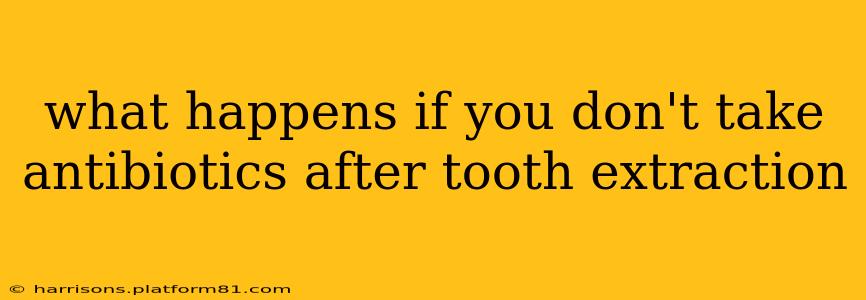Tooth extraction, while a common procedure, carries a risk of infection if proper post-operative care isn't followed. A common question many patients have is: what happens if I don't take antibiotics after a tooth extraction? The answer isn't simple, as the consequences depend on several factors, including the complexity of the extraction, your overall health, and your oral hygiene practices. However, understanding the potential risks is crucial for making informed decisions about your post-operative care.
Why Are Antibiotics Sometimes Prescribed After Tooth Extraction?
Antibiotics are typically prescribed after a tooth extraction to prevent or treat bacterial infections. These infections can arise from the open wound created during the extraction. The risk of infection is higher in certain cases, such as:
- Complex extractions: Extractions involving impacted wisdom teeth or teeth with significant damage often increase the risk of infection due to more trauma to the surrounding tissues.
- Pre-existing medical conditions: Patients with weakened immune systems are more susceptible to infections.
- Poor oral hygiene: Inadequate oral hygiene can introduce bacteria into the extraction site, promoting infection.
What Are the Potential Consequences of Not Taking Prescribed Antibiotics?
If you don't take prescribed antibiotics after a tooth extraction, several negative consequences could occur:
- Dry Socket: While not directly caused by a lack of antibiotics, dry socket (alveolar osteitis) is a painful condition where the blood clot protecting the extraction site dislodges. While antibiotics won't prevent a dry socket, a pre-existing infection makes it significantly more likely and more painful.
- Infection: This is the most serious risk. An infection can manifest as pain, swelling, redness, and pus at the extraction site. It can also lead to more severe complications, including cellulitis (a spreading skin infection) or even osteomyelitis (bone infection). These require more aggressive treatment.
- Prolonged Healing: Infections can significantly delay the healing process, leading to discomfort and potential complications.
- Need for Further Treatment: Untreated infections will usually necessitate further medical intervention, including stronger antibiotics, drainage procedures, or even surgery.
What If I Don't Have Any Pain or Symptoms After Extraction? Do I Still Need Antibiotics?
Even if you feel fine after your extraction, it’s crucial to follow your dentist's instructions regarding antibiotics. Infections can sometimes develop without causing immediate noticeable symptoms. Taking the antibiotics as directed helps to prevent the development of a silent infection that could later cause significant problems.
Are There Alternatives to Antibiotics?
In some cases, your dentist may recommend alternative strategies to prevent infection, particularly if the risk is low. These might include meticulous oral hygiene, regular rinsing with a saltwater solution, and careful attention to the post-operative instructions. However, the decision to forgo antibiotics should always be made in consultation with your dentist or oral surgeon.
What Should I Do If I Develop an Infection After Tooth Extraction?
If you experience signs of infection, such as increasing pain, swelling, redness, or pus at the extraction site, contact your dentist or oral surgeon immediately. Early intervention is crucial for effective treatment and to minimize complications.
Disclaimer: This information is intended for general knowledge and informational purposes only, and does not constitute medical advice. It is essential to consult with a qualified dentist or oral surgeon for any concerns or questions regarding your specific situation. They can provide personalized guidance and address your individual needs.
